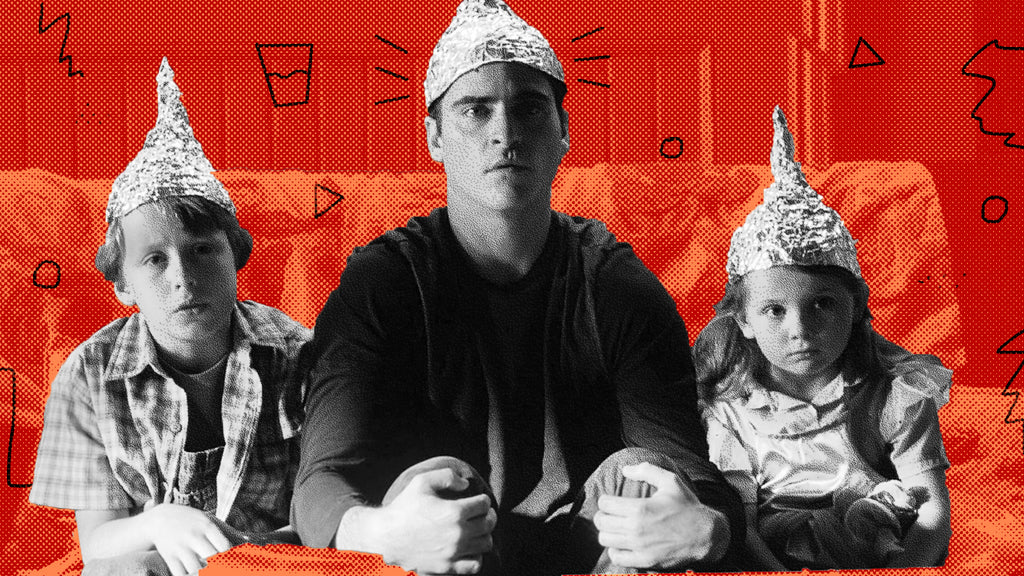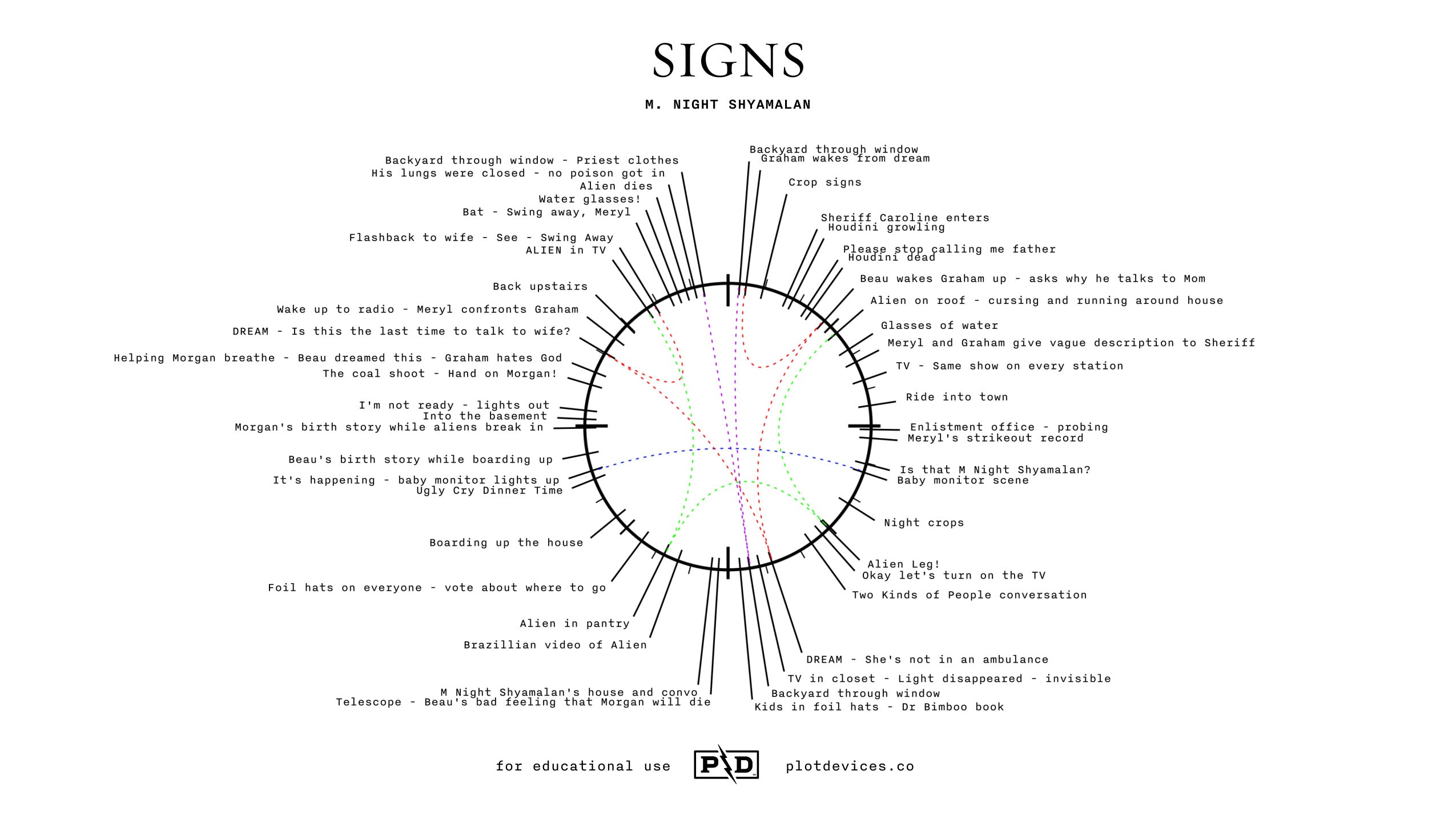Storyclock Research Log
M. Night Shyamalan's Signs

This week in the Research Log, we're clocking M. Night Shyamalan's SIGNS. As usual, we've watched the movie and used the Storyclock Notebook to visualize the film's structure in the form of a clock. Let's pour ourselves twenty glasses of water and get started.
Let's Break It Down
- Opening Image: A shot looking out the window into the backyard. Graham wakes up the way you do when you're a character in a movie who just had a bad dream.
- Normalcy: We're introduced to our four main characters: Graham, his kids Morgan and Bo, and his brother Merrill. Nothing in this family's life is normal, even without aliens. Everyone seems shell-shocked. There's a void. We feel it. Bo asks Graham, "why do you talk to Mom when you're by yourself?" Even though it's not normal, this is the normal in which we find these characters living. And we locate the pain point that'll be directly targeted and tested in this story when Graham tells Sheriff Caroline, "please stop calling me Father."
- Normalcy Disrupted: The crop signs weren't a disruption, they were storm clouds. The lightning strike comes in the form of an alien on the roof (as lightning strikes do from time to time).
- Herald: According to the TV, we've got aliens on our hands.
- Rational Approach: No radio or TV, Graham says. Everyone drives into town to try and feel normal. But everyone is talking about aliens. Except Graham. Graham don't talk about aliens. They also spot M. Night Shyamalan walking to his car, whose presence seems to upset them beyond the fact that he's the director of the movie.
- Acceptance and Break Into Act 2: We take a slow burn to acceptance, but it's nice and suspenseful. When Morgan uses Bo's old baby monitor to pick up alien sounds, Merrill is convinced but Graham is still holding strong. Don't even think about trying to get this guy to believe in something. Unless you're an alien, that is, in which case you just need to lure him out into a cornfield at night and flash your leg at him. This is exactly what happens, and it seems to do the trick because Graham's first words upon coming back inside are, "okay, let's turn on the TV."
- B Story Begins: So I kind of think Graham's faith is the B Story. It's sort of lurking in the subtext in the first act, then becomes one of the central talking points when we get into Act 2, starting with the conversation between Graham and Merrill on the couch about the "two kinds of people in this world."
- Trailer Moments/Promise of the Premise: Flashlights in cornfields (even though that technically happened at the act break), people in foil hats, foreboding book illustrations of aliens and dead bodies, Graham literally saying the title of the film, etc.
- Midpoint: Graham has another dream, but this time we get to see part of it: Graham, in clerical uniform, pulling up to what looks like the site of a car wreck, where Sheriff Caroline grimly tells Graham that his wife isn't in an ambulance.
- Things Get Worse: M. Night Shyamalan calls. Great, now Graham has to go talk to him. We're starting to think M. Night Shyamalan had something to do with the death of Graham's wife, beyond the fact that he wrote the script and made up all the stuff that happened in it. Meanwhile, Merrill sees a surprisingly terrifying home video on TV of an alien crashing a kid's birthday party in Brazil. Graham gets some closure with M. Night Shyamalan before discovering an alien in his pantry and getting the "distinct feeling" that it wanted to harm him.
- Hero's Last Resort: Graham returns home and asks the family how they want to handle the whole "aliens probably coming to murder them" situation. They all take a vote. They're staying.
- Game Over: Graham is resigned to the fact that they're probably all going to die, as evidenced by his insistence on a giant dinner and his weirdly sexual delivery of the line, "extra bacon." Morgan wants to say a prayer at dinner, but Graham isn't having it. God wasn't invited to this meal. He makes everyone cry, including himself. When Morgan sees how broken his dad is, he hugs him, breaking him all the way down. A desperately needed group hug ensues.
- Break Into Act 3: The baby monitor lights up. The TV signal goes out. "It's happening."
- Hero Gains Upper Hand: While the aliens start breaking into the house, Graham tells Bo and Morgan the stories of how they were born. Graham isn't fully healed, but he's finally got the energy he needs to keep his children feeling safe and hopeful.
- Shadow's Final Push: Into the basement everyone goes as the aliens enter the house. The aliens find the coal chute and manage to get a hand on Morgan. Graham coaches Morgan back to regular breathing, cursing at God in the process. They make it through the night, and everything seems fine until the alien from M. Night Shyamalan's pantry (or M. Night Shyamalan's THE PANTRY?) suddenly appears in the living room, threatening to kill Morgan.
- Ultimate Breakthrough: Graham has the final flashback to his wife's death. All the nonsense she said in her final moments was actually preparing him for this moment. "Swing away, Merrill," Graham repeats to Merrill as we suddenly notice the baseball bat hanging over the doorway. Merrill grabs the bat and he and James Newtown Howard proceed to go to town on the alien. M. Night Shyamalan's theory about aliens hating water turns out to be right, and Bo's tic for leaving glasses of water all over the house becomes another act of divine providence -- along with Morgan's asthma, which kept the alien poison from getting in his lungs.
- New Normalcy and Final Image: A shot looking out the window into the backyard, which pulls back and pans around the room, transitioning us several months into the future, where it's snowing, we hear children playing, and we see Graham getting dressed into his clerical uniform.
Stuff That Stood Out To Me
- Symmetrical Moments: The baby monitor scene on the car + the baby monitor declares the beginning of the invasion.
- Symmetrical Moments: Graham's dreams/waking up from dreams.
- Symmetrical Moments: Any time we actually see an alien.
- Symmetrical Moments: The "backyard from the window" shots.
- You can usually split horror movies into four acts:
- Horror Act 1: Things are normal.
- Horror Act 2: Something weird might be going on.
- Horror Act 3: Something weird is definitely going on, what are we going to do about it?
- Horror Act 4: Doing something about it.
- SIGNS follows this structure, although it's not as clean. It dives right into the madness from the very first scene, so its first two horror acts kind of overlap each other.
- I like how the logic of the aliens is pieced together from multiple sources, and none of them are verified (the news, the Dr. Bimboo book, M. Night Shyamalan's water comment), and they don't even all agree with each other (Morgan's "sounds made up" comment in response to the water theory). Whatever actions our characters choose to take, there's no guarantee any of it will work. That's what the ancient greeks called "tension," probably.
- James Newton Howard's score is so damn good.
I love SIGNS, but a lot of people don't. The most prominent argument thrown against it is the unspoken screenwriting law that you can't expect your audience to suspend their disbelief for more than one supernatural element in one movie. A movie with aliens is fine. A movie with God is fine. A movie with God and aliens is too many magics. And that's a reasonable argument! Maybe it's my Christianity, or my love for movies containing aliens, but this movie works for me. But I completely understand why it doesn't for some.
I'm in the middle of writing something that has a lot in common with SIGNS, which is why I chose it for this week's Research Log. When I'm working on a story, I like to analyze similar stories from a macro view, especially when I'm on a second or third draft and looking to fine-tune the pacing and rhythm. We designed the first half of the Storyclock Notebook for research, so you can analyze the stuff that inspires you and apply that stuff to your own ideas.




